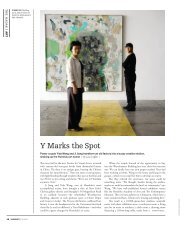The Scholarship of Teaching and Learning: TheoryâPractice - NAIRTL
The Scholarship of Teaching and Learning: TheoryâPractice - NAIRTL
The Scholarship of Teaching and Learning: TheoryâPractice - NAIRTL
Create successful ePaper yourself
Turn your PDF publications into a flip-book with our unique Google optimized e-Paper software.
2 INNOVATIVE HIGHER EDUCATION<br />
requirements <strong>and</strong> may be compulsory for tenure. While studies are<br />
underway to assess the impact <strong>of</strong> these innovative programs, very<br />
little research has investigated the theory–practice relationship <strong>of</strong> the<br />
scholarship <strong>of</strong> teaching <strong>and</strong> learning (SoTL) within a faculty certificate<br />
program context.<br />
This article presents a program development <strong>and</strong> evaluation framework<br />
to enhance the SoTL in a faculty certificate program. Action<br />
research methodology is central to this framework <strong>and</strong> is employed<br />
to develop <strong>and</strong> evaluate program processes <strong>and</strong> outcomes pertaining<br />
to the SoTL. This framework was applied to the University <strong>of</strong> British<br />
Columbia Faculty Certificate Program on <strong>Teaching</strong> <strong>and</strong> <strong>Learning</strong> in<br />
Higher Education (FCP). <strong>The</strong> 8-month FCP began in 1998, <strong>and</strong> over<br />
one hundred faculty members from various disciplines <strong>and</strong> academic<br />
ranks in six different cohorts at the University <strong>of</strong> British Columbia<br />
(UBC) have completed the program.<br />
<strong>The</strong> <strong>Scholarship</strong> <strong>of</strong> <strong>Teaching</strong> <strong>and</strong> <strong>Learning</strong>: <strong>The</strong>ory–Practice<br />
Implications<br />
Before presenting this framework, it is useful to review the literature<br />
pertaining to its foundations. <strong>The</strong> SoTL <strong>and</strong> its implications were<br />
first introduced by Ernest Boyer (1990). For over a decade, despite<br />
a growing body <strong>of</strong> literature on this subject, the term remained illdefined,<br />
varying from emphases on action research, reflective practice,<br />
teaching effectiveness, pr<strong>of</strong>essional development, <strong>and</strong> discovery <strong>and</strong><br />
advancement <strong>of</strong> knowledge (Cunsolo, Elrick, Middleton, & Roy, 1996;<br />
Kreber & Cranton, 2000; Schön, 1987). Recent attention, however,<br />
has provided greater clarity with respect to the theoretical concepts,<br />
principles, research, <strong>and</strong> practice implications related to the SoTL<br />
(Kreber, 2001; McKinney, 2004; Weston & McAlpine, 2001). At the<br />
very heart <strong>of</strong> this process is an approach to academic work that<br />
integrates research, teaching, <strong>and</strong> student learning. However, an<br />
important distinction is made between scholarly approaches to teaching<br />
<strong>and</strong> learning <strong>and</strong> the SoTL (Richlin, 2001). Essentially, scholarly<br />
approaches to teaching <strong>and</strong> learning can engage faculty at all ranks<br />
in reflecting upon <strong>and</strong> initiating positive changes to curricula <strong>and</strong><br />
pedagogical practices. Scholarly approaches to teaching <strong>and</strong> learning<br />
are key for underst<strong>and</strong>ing learning, for developing responsive <strong>and</strong><br />
integrated curricula, for enhancing the quality <strong>of</strong> student learning<br />
experiences, <strong>and</strong> for assessing which practices are effective in specific<br />
circumstances.











